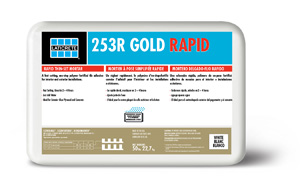Unlike unmodified mortar, which consists only of a blend of Portland cement, san and water retention agents, modified thinset includes additional retention products, such as latex polymers, which can increase its performance and strength. Fast setting even in cold weather. Adheres to most surfaces.
Fortified Thin-Set Mortar is a professional formula, all-purpose mortar, polymer-modified to provide good bond strengths. Suitable substrates include interior and exterior floors, countertops and walls. VersaBond cures quickly and adheres to most surfaces. Always add the dry thinset mix to the water — not the other way around. Use a drill fitted with a mixing paddle to mix the thinset.
Mix the thinset as if you’re mixing batter. Start slowly so as not to splash the powder or water out of the bucket and stop when it’s the. According to the ANSI, modified thinset must meet the same criteria as unmodified thinset. This also means that modified thinset has more than one ANSI assigned number on its bag. If your bag contains the number A118.

It can make a big difference which type of thinset is used with each product. Modified thinset relies on other additives besides the basic water retention agents, so moisture is essential to activate those extra additives and created the interlocking crystals that secure the bond between tile and concrete or backer board. The longer that moisture is in play, the stronger the bond becomes.
What is the difference between modified and unmodified thinset? How to mix thinset mortar the proper way,? Polymer-Modified Thin-Set Mortars Polymer-modified thin-set mortar options are among the most popular for setting tile.
They are ideal for mosaic, small or medium-sized tile installations on walls, floors or countertops. Selecting the proper polymer-modified thin-set mortar for tile installation will add years of life to your new flooring. Modified thin-set mortars are similar to unmodified thin-set mortars, but include additional polymers such as latex. The additional polymers are introduced in either liquid or powder form.
In the first case, the user mixes an unmodified or dry-set mortar powder with a liquid polymer additive instead of water. This is a cost-efficient, all-purpose mortar. Porcelain Tile:Most thinset manufacturer’s want you to use a modified mortar for porcelain tile. Porcelain tile is near impervious and can be difficult for the mortars to grab a hold of which is the reason for the modified mortars. Any thinset that does not contain these is an unmodified thinset.

This post began as a description and information on unmodified thinsets and which are better. Apparently unmodified thinset dries using a chemical reaction of Portland cement and water as compared to the evaporative drying of laytex modified thinset which requires air flow in order to fully set. Shop mortar and a variety of flooring products online at Lowes. Product description.
Sag-resistant and ideal for setting tile on both horizontal and vertical surfaces, Ceramic, Porcelain, and Stone Tile, including large and heavy tile. For instance, if it says on the bag that the product meets ANSI standards A118. The Ditra packaging says to use modified thin-set mortar ANSI A118. For rectangular plank tile , use a medium bed mortar such as 7marble pro. A light weight thinset is commonly used on walls.
Light weight thinset - such as Merlite 8- is less likely to sag if used properly. For most installations a modified thinset such as the 7or 7is recommended.

No comments:
Post a Comment
Note: only a member of this blog may post a comment.